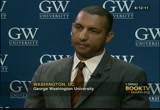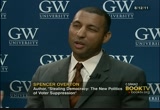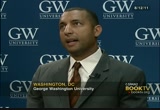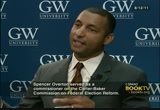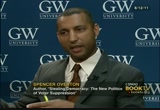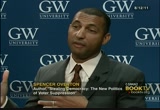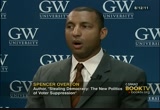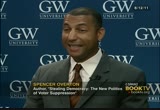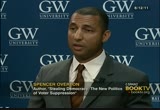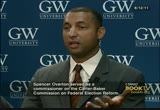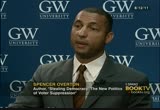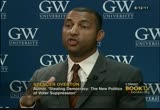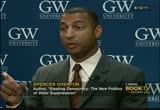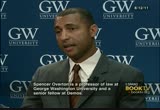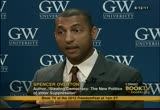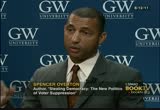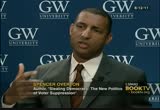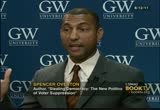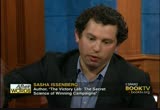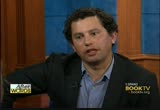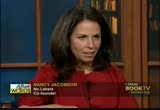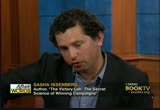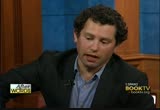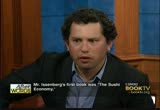tv Book TV CSPAN September 30, 2012 11:30pm-12:00am EDT
11:30 pm
what is the voting matrix that you talk about? >> there's a movie called the matrix, and basically in that movie, computers are in control. people think they are in control, but in fact, computers are in control. i was fascinated by this theme of these on seen factors that control our lives committees and visible systems that control our lives, and that is what is really with regards to our election system. we don't think about it. we think that the people so that the politicians, but actually in fact this matrix of election laws and systems and regulations shape who gets elected and the policy in the country and they determine or shape the level of mercury in the air that we brief, how many kids are in a classroom in the city of detroit, so they have a huge
11:31 pm
impact the we don't always appreciate. >> explain how that matrix works. where do they start and how far do they go? >> one unique thing about the united states is that we don't have a central system in terms of the election. we have got over 4,000 difrent election systems and the of different rules and laws and people who administer them said there isn't like one puppet master like some grand conspiracy. we've got all these different systems and the people that are familiar with the most common example of this which would be gerrymandering where politicians draw districts that favor them. congress is about a 14 or 15% approval rating or maybe even lower than that. yet 85% of members of congress are safe because they have drawn
11:32 pm
their districts or state legislatures have drawn their districts so that those members are safe so that is the most blatant form but when we talk about the voter i.d. procedures and talk about the placement of the polling machines and a variety of other practices and regulations that shape the outcomes and policies and winners and losers. >> who is michael berman? >> michael berman is a person who handles redistricting in california. he's a democrat and his brother howard berman, was a member of congress, and he had an organization called the ad campaigns so it was his job to draw the map in california. he did a couple things. one thing he did was his brother's district he dropped it from 45% latino down to 31%
11:33 pm
latino, his brother would be safe and wouldn't face a challenge in the democratic primary by a latino candidate. another thing he did is got democrats and republicans together to pursue incumbent power so in other words sometimes we see these gerrymanders meaning one part is trying to pick up as many seats as possible, in california in that particular year basically the democrats get together with the republicans and they said let's not push for party gains but preserve our own seat and focus on incumbent gerrymandering and draw districts that benefit us so we are not challenged. that's burma. >> what role to the computers play in the current election system? is it good or not so good?
11:34 pm
>> computers are a tool so i think they can be great and they can also cause problems. with people like michael berman they can do more than ever. they have much more data, they can map things much more easily before people used to guess and estimate about the census and where people lived and taking the data from the list and putting it on a map and that kind of thing. now politicians are much more efficient in terms of drawing maps and so on the one hand, it in powers politicians and on the other hand, people can actually draw their own maps. there's a technology democratizing of this tree certain extent.
11:35 pm
many countries in the world have the registration modernization that means that the government register's people we and you don't have to turn in a paper form and it's not on the individual and because it is automatic more people registered and more people in the boating said it can be a good of increasing access or it can be bad in terms of manipulating rules. >> do you trust the electronic voting machines? >> i think there are certain safeguards we need to have in terms of electronic voting machines. we need audits and backup systems which more monitoring. the best analogy is las vegas. they have electronic machines in terms of the gaming machines and
11:36 pm
there are people who are on the inside who manipulate some of the machines, people who have been caught and imprisoned and as a result they have procedures to check the folks that were on these machines it isn't like a slot machine and it's important that we have checks come structural checks to ensure there is intent bearing or fraud or a problem. >> you use the word suppression the new politics of the voter suppression. how're they suppressed by not registering everybody automatically or are we talking illegal activity to suppress the voters cox
11:37 pm
>> the question is what is illegal. it is in proper. if you are going to make a law that suppresses the voters is that necessarily illegal but it can be in proper when we talk about the goal of government of and by and for the people, so just for an example i know that voter i.d. is widely popular and most people say you need an passport to get on an airplane and go into the committee agreed voter i.d. is a good thing. the problem is 20 million americans don't have a photo id and that is 25 million more than delaware, new mexico and about ten orie 11 other states combined so there are people who
11:38 pm
don't have an id. that's the problem on the other side of the equation there isn't that much out there and i mean at the polls that we do see as absentee fraud as opposed to at the poll fraud so in ohio for example they did a study and they found that for every 2 million votes cast there was one that was improper so one vote out of 2 million so my biggest concern is we are throwing the baby out because the baby has a drop of bath water and we need to figure out how to focus on a drop of bathwater as opposed to bring the baby out. estimate what about the location of the polling places? >> it's important in the variety of factors one is the location but also things like a machine can't have money are in the polling place, and it's important because we want
11:39 pm
everybody to do but to cast the vote and if it is more difficult for certain people, certain populations and precincts that is great shape the outcomes and i will give you an example the officials knew they needed 5,000 machines that they decided instead to only do 3,000 machines. it takes her for hours that she waits in line to vote and she goes over to another, took her mother on the beat of 15 minutes to cast about what we have got the this devotees in terms of voting in the opportunity to vote. it doesn't take four hours at starbucks or mcdonald's to read those companies if you had to wait in line that long they would go out of business. voting is as important as a
11:40 pm
frappucino work order number -- or quarter pounder. i think it is not an innocent terms of the hate those people and let's exclude them. i think all politicians of all backgrounds our conscience of race because they are connected to performance. many of them voted democratic and it matters to democrats and republicans. they might take a different. that is the basic example with what happens to other groups as well so it's the performance of the voters and that motivates politicians much more than we
11:41 pm
don't like this group so what's been mean to them and i think there's a very practical aspect of these rules. >> what is the history of the election day first tuesday of november and how would you like to see that change? >> the history goes back to the our agricultural society. basically. and the society as well as having church on sunday and this notion of everyone being able to get in town after the harvest in terms of november and after that sunday having a day of travel on monday to get into cast the vote on tuesday that's outdated and it is no longer the way our society is organized. i am comfortable with an extended period.
11:42 pm
one concern is i'm sensitive to the notion that the campaigns peak so if you have a month or six weeks that may not work was certainly something like a week or week and a half would certainly be adequate in my mind in the government the reason this is important is so politicians can focus on issues rather than shooting the turnout that means we can avoid the issues and just manipulate the electorate in a way that affects one party or another to the extent they know there is to be massive turnout than the way that they can win is not to suppress voters or put out particular voters but to argue the merits and the policy to explain why their position is
11:43 pm
better for the future of the country. it's been a good about mandatory registration and mandatory voting? >> i'm very comfortable with the concept of automatically register in every one just as everyone we have to serve on a jury or pay taxes, very comfortable with that. one reason i'm incredibly comfortable with that is that in the 2018 election by think it was, 70 million people didn't vote and 80% of those people were unregistered seóul registration is one of the biggest barriers to voting. also when we talk about things like purging people from voting rooms and about the provision about what's not being counted and people not being on the rule, a lot of that is directly related to the registration problem. so very comfortable with a voter registration. in terms of the mandatory voting its its local question and i think other countries do have
11:44 pm
mandatory voting just like the jury service or some people have to serve in the military in the compulsory service. one problem with it is i think we have a culture of liberty here in this country. so if we have mandatory voting i certainly think we would want to have a none of the above option so that people could exercise it. politically though we don't know if it is realistic. i think a lot of people would resist it. as opposed to the need for something that is unrealistic writing we should really focus on how do we make boating accessible to people so that as many people as possible participate. >> would you teacher the george washington university? >> i teach the voting rights and a lot now in terms of campaign finance. you know, we had a citizens united decision which allows corporations to spend on
11:45 pm
politics. we also recently had the opinion by the supreme court striking down a public financing program in arizona. and my kind of new version of campaign finance is that we shouldn't focus exclusively on preventing the corruption and we shouldn't focus exclusively on noeth rules and just money at a speech and spend as you want. i think what we should do is encourage participation by as many people as possible. we definitely have a norm in voting that we want everyone to vote. why don't we have a similar norman terms of money in politics where we want everyone to give a contribution. it can be $10,000 contribution but if more people participated in the financing of campaigns i think politicians would be frankly left holding a particular larger contributor to
11:46 pm
now give the bulk of the money politicians received some kind of carrying this participation theme from voting over to the money and politics. >> here is the original cover of "skilling democracy," and in the paper back came out. any reason the different covers? >> the publisher made the decision to change the cover. i actually like the very simple vote that is suppressed in terms of sending the message they're but frankly you were flattered when the book goes to paper so i was very happy with any cover in terms of the paper. >> is the south still a problem when it comes to suppressing voter rights as it was back in the sixties and fifties? speed it's part of the voting act which is called section 5 of
11:47 pm
the pre-clearance provision and it applies to only certain states. many are in the south, not all of them and also applies to particular counties may be one in michigan and california and alaska and there is a national debate right now whether or not that this constitution and violates the state's whether this is a state issue and the government should get involved we just have an anniversary of this act. i think it is still an issue and is it worse than other places? i think it is a legitimate question put this motion of the czech check of partisan officials and the changes i think it's a good thing.
11:48 pm
i think it's a good thing in part because an ounce of prevention is worth a pound of cure better reviewing any election change before it is made as much less expensive than the litigation after the fact after you've had an election it can be discriminatory or problematic. i think also with this review does is help not just voters of color because they're less likely to engage in shenanigans when they know that it's printed be reviewed, very sensitive to the question of whether or not this formula that applies to only particular states remains legitimate and was set up in the 1960's is that still the same formula that is a legitimate question, but the question of should we have a check on voting procedures parker maybe we
11:49 pm
should have a check on the voting procedures nationwide simply because there is an opportunity for mischief and self-serving behavior by some election officials are politicians. >> do you have another but you are working on? >> right now i'm focused on money and politics and academic articles i see possibly coming together in a book but right now i was in the ball administration for about a year-and-a-half and work on the policy for the campaign and also did a the transition to read when you come back into the academy you want to have academic credits. i certainly enjoyed books but i also want to come back and send a message to my colleagues that
11:50 pm
i'm back and i have new ideas from my experience and great new academic ideas and while we will eventually put these into book form, some academic articles that is the first thing out of the box. >> spencer overton stealing democracy the new voter suppression. here's the hardcover and here is the paperback. thank you for joining us on booktv. >> thank use a much. i appreciate it. up next on booktv "after words" with this week's guest host no label cofounder nancy jay gibson. this week's sasha issenberg and his latest book the victory lab. the author of the sushi economy pulls the curtain that of the operatives that use social science to determine the outcome of elections.
11:51 pm
>> host: well, sasha this is a provocative and timely look as we are weeks away from the election. i want to know how did you come to want to write this book? >> guest: i covered campaigns beginning in philadelphia, so i was paying more attention to sort of tactics and techniques in the physical world of campaigns just because in the big city so much attention was being paid to the vote counted and precinct targeted so i talked to people that were making tv ads and i was always shocked as i think anybody that spent time on the campaigns is that most people couldn't explain to me why they did anything that they were doing. how do you know that and why do you do that and at some point they did it because the it always done it that we were they had some sort of a rule that wasn't based on any research. so some sort of skepticism about a lot of practices that were
11:52 pm
taking place and the way people were spending money and devoting time and resources and as i learned about people starving in academia doing these randomized control trials rather than being adopted by people in the political world and learn more about the innovations in the thus and targeting they were revolutionized campaigns and the last decade but this is a major generational shift and in addition to the new forms of research changing you have a cultural tension between a lot of the old practices the weekend and operated and the new empirical movement. i covered the 2008 campaign for the "boston globe" and i was traveling with candidates learning mostly about the sort of message going back and forth and after 2,009i really sort of burrowed down in this world of
11:53 pm
people doing research in the campaigns in academia and institutions in washington and elsewhere and i was convinced that is where the untold story of a lot of what is really going on these days is taking place. >> host: interesting. what do you want the reader to understand when they read this book what is that nugget that you want them to come away with? >> guest: i want them to understand what we see on tv and in the newspaper every day as continent of the campaign is very little of everything that is going on. campaigns are far more than what is said in their ads or were the candidate goes that is too much of the campaign coverage that assumes this is sort of the entirety of the campaign activity.
11:54 pm
most campaigns and the provincial level most part doing other things and that is the candidate giving a speech, buying ads, explaining why they do what they do in many ways it hasn't changed with the stuff that is invisible to less cost if i try to write about in this book that is taking place with people who don't go on tv and people whose names are almost entirely unknown the outside world has changed radically in this changing every year and every month and campaigns are getting a lot smarter about what they do, how they do at and the general campaign coverage struggling to keep up explaining to the voters and the viewers what they are doing and why and it's undergirding all of that. >> talking about the victory lab you have a picture in your mind that there is this lab.
11:55 pm
can you give a perspective on the campaigns how many people were working on this stuff? a typical campaign, how many people are usually working on these campaigns and how many people would be working on this sort of data and analysis and all the things you're talking about? >> guest: on some level on the smart campaigns the data analysis and to listen to the co empiricism is sort of informing everything they do. there's more and more stuff on the campaign that you can test either through the rigorous experimental but it took her some sort of a even if it isn't randomized there is some sort of discipline testings of the smart campion's coming you know, and the obama campaign issues informed by the the data. they are having people that are voter file managers who are
11:56 pm
stealing the data and targeting people you get to the presidential campaign and one of the things the romney campaign had to do after this summer when they won the nomination is the voter science team and increasingly that sort of function is becoming a core function of the campaign. it used to be that to the extent you had a that was less for fund-raising and you could buy them from the voters or consultants. people now have what they call different things but it's basically the core function of the modern campaign to have a discussion on the voter side crunching and processing data. >> host: if we were to go to the romney campaign, how many people -- is there a lot of young staff? >> guest: in chicago dozens of people on how you define it in the fund raising data online
11:57 pm
analytics in every state they are hiring for better data jobs and voter file managers and targeting directors that's the the bombing campaign has thousands around the country and they are directly interacting with every day. >> do you think the party of the republicans or democrats is more at that at using this technique or are they all the same level? >> guest: the democrats are ahead and we have seen leapfrogging from cycle to cycle, and one of the things that becomes clear as i looked back over where innovation takes place it is one of the stories they are resistant to innovation. if you build a company it lasts six months or 18 months. you don't know if your budget is going to be in advance.
11:58 pm
you are concerned about market share, nobody has a the incentive to invest that would yield lessons after the day of the election. typically, the person who is the chairman of the board of a campaign of a candidate, there are two types of them. there's somebody that has either done it before and they think they know how to do it and maybe has been doing it over and over again and is perfectly happy with keeping things the way they work or somebody that's never done it before and there is no reason 70 must be a senator or governor were sheriff to run a political campaign and the more technically advanced, the less the candidates should be expected to understand these things when they are not built to innovate and learn from their failures. when i look back at the presidential campaign, you see how the reelection campaigns are sort of.
11:59 pm
they are in some form or another. the then able to plan to some degree a budget over four years, staffing over four years. the often don't have a primary. they're trying to distract them in the short term and for the bush campaign was revolutionary and you see these tactics applying them and the obama campaign 2012 modeling and other techniques is taking place and part of that is that you can set out a research agenda. in chicago there was a post mortem committee set up in november of 2008 for people who were doing détente targeting. almost four years now they went through they did right and wrong and what they want to fix in the future, and it's really unusual but the campaign and
138 Views
IN COLLECTIONS
CSPAN2 Television Archive
Television Archive  Television Archive News Search Service
Television Archive News Search Service 
Uploaded by TV Archive on

 Live Music Archive
Live Music Archive Librivox Free Audio
Librivox Free Audio Metropolitan Museum
Metropolitan Museum Cleveland Museum of Art
Cleveland Museum of Art Internet Arcade
Internet Arcade Console Living Room
Console Living Room Books to Borrow
Books to Borrow Open Library
Open Library TV News
TV News Understanding 9/11
Understanding 9/11